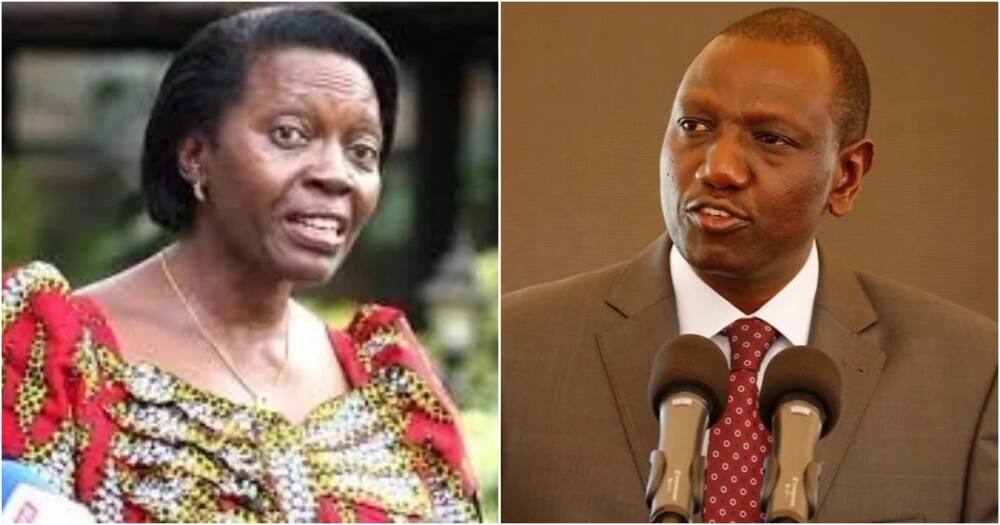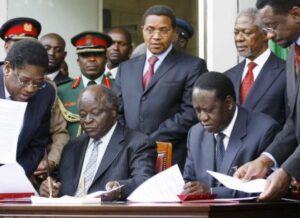Dar es Salaam,
Former Tanzanian president Benjamin Mkapa has said locking out Mr. William Ruto and Ms. Martha Karua from the post-elections violence mediation team in 2008 helped secure a power-sharing agreement between President Mwai Kibaki and Orange Democratic Movement leader Raila Odinga.
Violence erupted after the December 27, 2007 elections where the incumbent, Mr. Kibaki of the Party of National Unity (PNU), was declared the winner of the presidential vote, results disputed by Mr. Odinga and many other observers.
BELLIGERENTS
In his book, Mr. Mkapa also reveals how Ugandan President Yoweri Museveni nearly rocked the mediation boat as wealthy Kenyans piled pressure on the negotiators and belligerents for an agreement.
The talks would eventually lead to the signing of the National Accord and subsequent formation of a government of national unity – also known as the Grand Coalition Government.
Mr. Mkapa recalls that Mr. Ruto of ODM, who is now Kenya’s Deputy President in the Jubilee administration, and Ms. Karua of PNU, now Narc Kenya leader, “were the most difficult people to deal with”.

He says the two politicians often exacerbated tensions during the talks.
“The atmosphere changed when we got Kibaki and Odinga together without Karua and Ruto present,” Mr. Mkapa says in his memoir My Life, My Purpose. A Tanzanian President Remembers.
The book was launched in Tanzania’s commercial capital Dar es Salaam on Tuesday.
It recounts the intrigues that characterized the 39-day mediation that was chaired by former United Nations Secretary-General Kofi Annan, who died in August last year.
In his book, Interventions: A Life in War and Peace, Annan also dedicates a chapter to Kenya’s post-election violence.
OBSTINATE
The book says Mr. Kibaki’s negotiating team was more obstinate than Mr. Odinga during the talks.
Contacted, Mr. Ruto told the Sunday Nation: “Kenya has moved forward.”
Ms. Karua, a former Justice minister, said: “Let him (Mr. Mkapa) have fun.”
Apart from the two, others in the negotiating team were Mr. Musalia Mudavadi, Dr. Sally Kosgei, and Mr. James Orengo for ODM.
The PNU side was represented by Prof Sam Ongeri, Mr. Mutula Kilonzo, and Mr. Moses Wetang’ula.
Mr. Mkapa described the Kenyan experience as his toughest mediation assignment outside his country, where he navigated talks in 2000 to block attempts by Zanzibari president Salmin Amour to extend his stay in office for a third five-year term.
INTRANSIGENT
Mr. Mkapa’s account of his mediation in Kenya and later in South Sudan as well as the Eastern Democratic Republic of Congo is captured in chapter 15 of the book under the title ‘Pseudo Retirement’.
The Tanzanian leader says it was the decision of his successor Jakaya Mrisho Kikwete to sidestep Mr. Ruto and Ms. Karua that broke the deadlock in the talks.
He says ODM and PNU teams could not agree on almost anything until Mr. Odinga and Mr. Kibaki were hoarded into a room with only the negotiators, who included Graça Machel, the wife of former South African president and freedom icon Nelson Mandela.
Mr. Kikwete had just assumed the chairmanship of the Africa Union from Ghanaian President John Kufuor, who first steered the talks in Kenya before Annan was asked to step in by the UN.
Before then, Mr. Mkapa says in his book, the ODM and PNU sides were intransigent as they argued fiercely about who won the election and thus deserved executive control of State levers.
It was particularly difficult for ODM to accept Mr. Kibaki as president of Kenya.
“We would meet each team separately, then together. When together, they would have fierce arguments. Sometimes I thought they would go for each other’s throats,” the former Tanzanian president says nearly 12 years after the deadly events that almost tore Kenya apart.

MUDDIED
“Ironically, if matters got very heated, we would adjourn to have coffee and stroll outside together, where they would mix as if they were compatriots or even friends, conversing easily and sometimes laughing.”
He recalls that President Museveni muddied the already dark waters when he arrived later in January to try to help things out in his capacity as chairman of the East Africa Community.
But the Uganda leader, Mr. Mkapa adds, made remarks that painted him as being pro-Kibaki.
Mr. Museveni would quietly leave the talks and fly back home.
Mr. Mkapa says his involvement in the talks shortly after the post-election skirmishes in December 2007, was first under the umbrella of the African Forum of Former Heads of State.
“Joaquim Chissano (former Mozambican President) called Quett Katumile Masire (former Botswana President), Kenneth Kaunda (former Zambia President), and I, saying ‘let’s rush there before things get very bad’.”
SADDENED
Mr. Mkapa, however, adds that the former presidents of Mozambique, Botswana, and Zambia, struggled to make an impact.
Mr. Mkapa believes that a visit by the mediation team to camps where victims of the violence and the internally displaced were, calmed tension and restored hope in Kenyans.
He says he was saddened by the images he saw at Eldoret stadium and Kiambaa Church, also in Eldoret, where more than 40 women and children were burnt to death on New Year’s Day in 2008.
“Poor innocent children were killed or injured. So sad. What did Uhuru (independence) mean to these suffering people who had lost loved ones, or had been injured and fled their homes? How could any leader condone this? It was tragic. I hope this never happens in my country,” writes the former president who took over from Mr. Ali Hassan Mwinyi as president in 1995 and left office in 2005.
In the locked room with only Mr. Kibaki, Mr. Odinga, and their lawyers Amos Wako and James Orengo respectively, the mediators made it clear that Kenya’s burden and the way out of the bloody crisis were squarely on their shoulders.
PRAGMATIC
“We locked ourselves in until we finally resolved the outstanding issues. We stressed to the two leaders that what mattered was mutual respect and establishing a working relationship as it was high time for them to be pragmatic,” the former president goes on.
Mr. Mkapa adds that at that juncture, Mr. Odinga and Mr. Kibaki realized that the stalemate could not continue and had to find a solution.
“What’s more, the effect on major businesses such as tourism and flower export were beginning to be felt by many wealthy Kenyans,” Mr. Mkapa says.
The team eventually agreed on issues that the government of national unity would tackle and the size of the Cabinet, which ended up with 44 ministers and many assistant ministers.
Once Mr. Kibaki and Mr. Odinga agreed to share power, the negotiation team put an extra valve, skipping the need to have the two leaders’ locked-out cronies endorse the deal.
“We decided not to call in the negotiating team. Rather, we would present that team a fait accompli,” Mr. Mkapa says.
ANTAGONISTS
“When these two (Ruto and Karua) heard that they were being invited to witness the signing of the agreement, they were furious, saying there had been a conspiracy to persuade Kibaki to agree,” Mr. Mkapa goes on.
The former Tanzanian head of state says he is proud to have been part of the efforts to prevent a precipice in neighboring Kenya and puts it down to negotiators being honest with the antagonists about the grim consequences and appealing to their inner conscience as humans.
- Mkapa’s Life Journey: From Being A journalist To Tanzanian Top Seat
- Tangatanga MP Offered Cash, House Leadership POst To Dump Ruto
- This Is Why Diamond Platnumz’s New Signee Cried After Meeting President Magufuli
- John Magufuli tells men to marry Diamond Platnumz’s ex-girlfriend
He describes Annan as being “very good at consulting with the affected parties.”
“He listened, he asked questions,” he says.
However, he adds that the former UN boss was somewhat too open with the media.
“Often his comment was, What do the media say?” the memoir says.
HEADLINES
Mr. Mkapa believes it was the UN and not Mr. Annan as a person who wanted too much exposure.
“This is the United Nations: let’s have a picture, who is going to talk, what shall we say? In very difficult negotiations, you must be sparse with disclosure. I know the newspapers want their headlines, but you should limit yourself to saying: ‘Today we made some progress. That’s it’.”
(Story Done By Daily Nation)